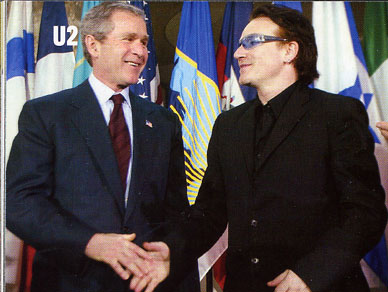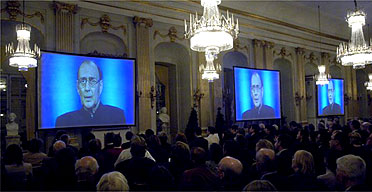December 22, 2005
Christian subtexts
Zoe Williams is right to notice an odd trend in the responses to the recent Narnia film. 'There seems to be no discussion of The Lion, the Witch and the Wardrobe,' she wrote last week, 'that isn't prefixed with "Besides the dodgy Christian subtext" or "Dodgy religious allegory aside"'. The merits of the film aren't at issue here (I haven't seen it, but hold out little hope for its quality); what is interesting is the way in which Christianity has come to attain a status as low as that of Nazism. (Or perhaps Christianity is even worse than Nazism - so you might conclude, given that not every reviewer of Lord of the Rings felt it incumbent upon themselves to refer to its fascist subtext.) Yet, as Williams also noted, it isn't clear what the supposed problem with Narnia's Christian references is: plagiarism? potential for appropriation by hard right fundamentalists? I wonder if the same judgement would be made about Paradise Lost? ('OK except for the dodgy Christian references.')
The denigration of Narnia's Christianity is all of a piece with the multiculturalist attack on Christmas (the right wing decrying of which is now an established part of yuletide tradition in Britain). This year's big story was the withdrawal of funding for a Christmas choral service on the grounds that it was 'too Christian'. What is odd about such moves is that they fundamentally misconceive the already non-religious character of Christmas. Zizek, indeed, has cited Christmas as the paradigmatic form of disavowed belief. '"I do not really believe in it, it is just part of my culture" effectively seems to be the predominant mode of the disavowed/displaced belief characteristic of our times: what is a "cultural life-style" if not the fact that, although we do not believe in Santa Claus, there is a Christmas tree in every house and even in public places every December? Perhaps, then, "culture" is the name for all those things we practice without really believing in them, without "taking them seriously."' (Perhaps what is 'dodgy' about Lewis is the vulgarity of his 'real' belief; by contrast, a postmodern syncretic hackjob like Harry Potter is perfectly acceptable since there is no question of Rowling or anybody else 'really believing' in sorcery.)
Even as it genuflects towards the supposed 'feelings' of those Others who really believe, who take their religion seriously, this kind of multi-culturalism actually trades on racist imagery. The rationale for 'Winterval' instead of Christmas, for 'inclusive' celebrations instead of carols, is an appeal to the 'feelings' of non-Christian groups which will supposedly be 'offended' by overt expressions of Christian faith. Those who really believe, we are invited to think, are as intolerant as 'we' are tolerant. Tolerance turns out to be the privilege of the powerful. The situation is asymmetrical; 'we' demonstrate our tolerance by allowing Them to give full reign to their intolerance. They live in a state of hair-trigger perpetual readiness-to-be-offended which has to be appeased (lest, presumably, they express this offence as a violent savagery which is implicitly attributed to Them in the multi-culturalist imaginary.)
Yet all of this misses the fact that the danger Christmas poses to 'real belief' comes not from any supposed exclusivity, but from its undemanding inclusivity. Christianity has become nothing more than a subtext in Christmas itself, a festival that everyone knows was appropriated from paganism. Vapid, cored-out feelgood sentiments that no-one could possibly disagree with: that is what religion becomes when it is no longer a matter of belief but cultural lifestyle.
__________________________________________________________________
Marcello's end of year round-up is the perfect antidote to the dismal Observer Music Monthly run-down (which, to its credit, at least kept Kaiser Chiefs at 62 and Coldplay at 18 - 18th best album of the year, eh, talk about damning with faint praise). I wholeheartedly concur with what Marcello said about The Young Gods; that they were a missed opportunity, denizens of an alternative late 80s in which modernism never ended. When I saw them a few weeks ago at the truly bleak Barfly (a toilet in Camden), I thought that there is absolutely no reason why the Young Gods weren't stadium-massive. They are built for stadiums, their sculpted crash chords designed to send shudders through amphitheatres. With their heightened elemental mother-sky widescreen imagery, their rock rebuilt as sampler-simulated Mount Rushmore granite vastness, they have everything claimed of U2, but with the considerable advantage of not having Bono spoiling the panorama. In any just universe, U2 would be playing the Barfly and the Young Gods would be playing yet another worldwide tour to thousands. But we are trapped in a universe in which Trad and Real Ale always triumph... Or so it seems at the moment.
_________________________________________________________________
I'm going to Wales for Christmas, where I will only have intermittment net access. So posts will be sporadic for a while. I hope to get at least one post up before the weekend, but apologies if I don't manage it.
December 20, 2005
'In Marxist terms, Bono is a syndicalist.'

... according to U2 manager Paul McGuinness, quoted in Paul Morley's embarrassing puff piece in the latest Observer Music Monthly. McGuiness's absurd claims are bad enough, but Morley's citing them without subjecting them to merciless derision is frankly unforgivable. Still, Morley's own estimation of Bono - 'he is a face and voice of radical ideas' - indicates his critical faculties are not exactly at their most acute when it comes to U2.
December 18, 2005
$

Well, what with the arrival of Savonarola onto and the unexpected return of The Pill Box (a pre-yuletide gift everyone should welcome), together with the re-igniting of Church of Me, Woebot and Heronbone, there's something of a weblog renaissance happening at the moment.
In this context, I'm delighted to announce the arrival of another high-quality, high-concept weblog. Subject Barred is the new blog of my long-time net pal and alt.movies.kubrick veteran Padraig L Henry. Padraig's consistently brilliant posts at amk, often corruscating, always ridiculously well-informed, reference-glutted and insight-heavy, but delivered in a style that was stiletto-sharp and quicksilver limpid, were an inspiration in my dark days and a major reason why this blog exists. As I think the rash of early posts at Subject Barred amply demonstrates - image-rich micro-essays on Gaelic Gothic, Kapital's [hysterical] Obstacles to the Impossible and The Real as Cute Little Girl - Padraig is a natural for the blog format. $ is already plugged directly into current discussions at Lenin's Tomb, Le Colonel Chabert and elsewhere in the weblog matrix. Expect the best.
December 13, 2005
In memoriam

Whilst reflecting on Richard Pryor's death - and no-one is more eloquent on this matter than the pawboy - it is worth remembering one of Pryor's least celebrated achievements, his masterly playing of the lead role in Paul Schrader's Blue Collar, a film that is, justly, a favourite of Savonarola's. Shot through with Schrader's signature Calvinist nihilism, unflinching in its depiction of the institutionalized complicity of 70s Unions with capital, Blue Collar could hardly be described as straightforwardly leftist. Yet is there a more powerful debunking of that hoary old myth of the US as a classless society than this?
Pryor, scarcely recognizable even at the beginning of the film when his loose-cannon factory-floor rebel at least bears some resemblance to his trademark persona, is by the end of the movie a haunted wreck, a mirthless, wised-up dupe of the reality principle, about as far from the invincible, quickfire, stand-up jester we know and love as you can imagine. At the start, Pryor - who won't let either the Union officials or managment forget the small things, the things that, when, day after day, they're still not fixed, make life unbearable - is the Conscience dogging every compromise and sell-out the Union tries to push through. The question he relentlessly poses - 'What makes your family matter more than my family?' - permits no hiding place for those who would feather their own nests at the expense of their fellows. By the end, though... by the end, he is inducted, bought and sold, a company man... effervescence suffocated by a shame-faced realism, no longer the Conscience but the man dimly haunted by the pull of the Conscience he once was.... A parable for the (then) coming times...

UPDATE: Savonarola comments:
'It's interesting that in a sense the film reverses Pryor's much
hagiographed Damascene moment, when he walked off-stage after one of his
many accommodating, "Uncle Tom" performances, and decided to turn to the
often painfully confrontational politicised stand-up that he became better
known for (the "wino/junkie" sketch, excerpted in today's Guardian and on
the superb Live & Smokin' DVD, is quasi-Artaudian in its levels of
visceral discomfort and distortion).
By the way, in his 'Blue Collar Blues: Proletarian Cinema from Hollywood'
(now in the collections Gods and Monsters), Peter Biskind has this to say
about BC:
"Schrader's militantly anti-left, apolitical stance makes him an unlikely
choice to do a film like this, and apparently no one was more surprised
than Schrader himself. He told Cineaste that he "didn't set out to make a
Marxist film," but while he was working on the script, he "realized it had
come to a very specific Marxist conclusion. It seemed the only way to end
it." Well, beggars can't be choosers, so we had better not look this gift
horse in the mouth."
Biskind also goes on to eulogize the film, especially its final moment, as
"didactic cinema at its best", so that the Marxist truth, as it were,
transpires through the abjection of surrender, and the negative
possibility of political (rather than merely human, erotic or criminal)
solidarity, as in the last lines of the film:
"Everything they do, the way they pit the lifers against the new boys, the
old against the young, the blacks against the whites, is meant to keep us
in our place."'
December 12, 2005
One day soon there will be a post that doesn't mention populism
As the populism discussion continues on its way, it is by now strikingly clear that the opponents and the defenders of populism are talking about something quite different. This was evident when, over at the comments boxes at Le Colonel Chabert, Le Colonel was aghast at my describing Bush as a populist. For me, it would be hard to think of someone more exemplary of populism than Bush; as Mark Crispin Miller argued persuasively in The Bush Dyslexicon, Bush's downplaying of his privilege and his expensive education are attempts to position him as a 'common man' speaking 'plain common sense' in 'plain language' (which is why his numerous errors, far from harming his credibility, boost it). It was also argued that there are no examples of populism on the left and that, therefore, Zizek's critique was pointless. Leaving aside the fact that Zizek's attack on populism was prompted by a book by Laclau, one of the best-known leftists in academia, it seems to me that there are no shortage of groups on the left which correspond, to the letter, to Zizek's description. Something like the protests against the G8 typically target the oligarchy, 'the corrupt elite', rather than the capitalist system itself. The persistent targetting of Bush, the fixation on instances of corruption like Enron, to take but two examples, imply that, if only we had a less stupid President, if only corporations were run by people with moral probity, then the injustices of capitalism would be at an end. If this isn't the point, why harp on about examples of capitalist stupidity and criminality, as if a smooth-running capitalism staffed by selfless drones would be an improvement ? I take Lenin's point about the ruling class defending its own interests, but the focus ought to be on capital rather than capitalists. Acquisitive personality traits may be attributable to class, but the temptation to equate class with a quasi-tribal ethnicity rather than a structural position needs to be resisted.

One, recurrent, objection to anti-populism was best outlined by Lenin, again from LCC's comments boxes.
'Notes toward a definition of populism, then.
In one episode of Futurama, the evil demagogue controller of Momcorp has programmed all the robots in the world to rebel on Mother's Day and conquer earth. They are so transfixed by her, are programmed to be in fact, that there is no difficulty in moving from general cultish adoration of Mom to acceding to her demand to "Conquer earth, you bastards!" All she has to do is push a button. Curiously, this is given a pseudo-communist twist by an automated greetings card who joins Bender on a looting spree, calls him 'comrade' and advises him about the Glorious Robot Future.
There you have the liberal theodicy in all its blazing stupidity. Populism is the manipulation of the masses by a demagogue, who compels them to rise up under the rubric of a superficially attractive idea and then cunningly uses the situation to become a world-class tyrant. It also reproduces the [c]urrent vulgate of 'totalitarianism': that 'organicism' results in the crushing of the individual under impersonal institutions etc. Making the institution in question a globally dominant corporation renders the fairy tale palatable to the liberal audience.'
The implication is clear: attacks on populism are slurs on the masses. This needs to be reversed; populism is a slur on the masses. Populism - at least insofar as I understand it - does not designate popular movements per se, but rather, is defined by an appeal to a reified notion of the popular. The Populist is a category of the Other - the Other that is less intelligent than us, the Other that can only be communicated to when we patronize it. The masses as construed in populist discourse are never intelligent or dynamic but lumpen, stupid and venal. For example, it is not for nothing that 'postmodern racism' typically takes the form, not of a directly-owned prejudice, but a prejudice attributed to the populist Other, i.e. 'as far as I am concerned, unlimited immigration is no problem; however, They won't accept it, they will riot....' (And not only postmodern racism: this was in many ways old Enoch's position, after all.) This shows that, in many cases, elitist cynicism and populism, far from being opposed, actually require one another. Straussian neo-conservativism, for instance, combines both: on the exoteric side, there are populist appeals to Nation and Religion which, on the esoteric side, are dismissed (the Masters themselves having no need for such fripperies, of course...)
The fantasy of leftist populism seems to be that - in a strategy that couldn't be more opposed to Leninist 'splitting' - making concessions to the already-constituted, lowest common denominator populist Image is a necessary stage on the route to a more thoroughgoing emancipatory project. But low expectations are a trap, whose effect is usually to get reality to fall below them.
UPDATE: Dominic Fox joins the fray...
__________________________________________________________________

On a not unrelated note....
What troubles me about Pinter's recent, well-discussed Nobel address is what usually troubles me about Chomsky: surely he is telling us nothing that we don't already know. The problem is not the denial of facts - who, after Guantanamo, 'extraordinary rendition' and Abu Ghraib, cannot be unaware that America engages in torture? - but denial in that other sense: a disavowal of practical and libidinal complicity in those facts. It is not that, as Pinter says, 'these things never happened'; these things, whilst the subject of endless official denials, are well-known to have happened, which is worse. Pinter's address, after all, was a kind of answer to the question 'is a politics of truth still thinkable?' What was most noticeable about the lecture was the glaring fissure between the first and the second half; the first half, which corresponded to the 'writer's truth' that 'there are no hard distinctions between what is real and what is unreal', the second to the 'citizen's truth', which demands a firm demarcation between real and unreal, the true and the false. What was disappointingly absent from Pinter's lecture - but thankfully is present in his drama - was the Lacanian thesis that truth can only appear as a fiction. A shame, surely, if the political role of literature is reduced to offering brute (and brutalized) tracings of the empirical.
December 09, 2005
Vocal wraithes
So it's really true... in a development to be celebrated by discerning folk everywhere, Penman's back... properly, it seems....
It's just like old times, he's moaning about blogger and everything... (Someone give him a movable type site please!)
Here's his post on Coil and Kate Bush...
Oh and, by the way, everyone should read Owen's post on how Ghost Box's nostalgia differs from the post-modish variant that keeps much of 'current' pop locked into rewind.
December 08, 2005
You used to be the future

If I can be allowed for a moment to speak of politics in the Capitalist-Parliamentarian-Spectacular sense...
As a sequel to my post about what the Tories must do to win the next General Election, I have to observe that, contrary to many expectations, the party seems to be doing all the right things to return it to power. I think that David Cameron's victory in the Conservative party leadership election yesterday marked a sea-change comparable to Blair's rise to the top of the Labour Party a decade ago.
Incidentally, perhaps it is only with Cameron's election (by a clear majority, 68%) that Blair's only significant Leftist achievement can be apprehended: the destruction of the old Tory Right. We all know that Blairism was an extension of Thatcherism, but Blair's successful appropriation of Thatcherite ideology has at last, it seems, prompted the Tories to abandon their default comfort position, to go beyond the pleasure principle, the compulsion to repeat that has led them to catastrophic defeat at three successive elections. There's little to be celebrated in Cameron's 'reform' agenda, but at least it isn't the nasty authoritarian ha ha populism Howard, IDS and Hague all found themselves hawking. It remains to be seen whether the Tories will, self-destructively, revert to type, but there are reasons to believe that they won't do so this time.
Firstly, even the most hidebound Tory traditionalist must recognize that another reversion to the tired old certainties may bring about a self-destruction from which there is no recovery.
Secondly, Cameron and his team seem to be a much more wily group of strategists than their recent predecessors. The tendency has been for Tories to elect a leader who promises modernization only to fall back, or be forced back, onto the old territory when the going gets tough. But, as is demonstrated by his universally-celebrated performance at Prime Minister's Questions yesterday, Cameron is not about to fall into the trap of routinely denouncing Blair. His recent promise to abandon 'Punch 'n' Judy' politics wasn't only a concession to realpolitik, still less a gesture of gentlemanly magnamity, it was a well thought-out tactic. Howard allowed himself to be forced into a corner by opposing Blair on everything, with the result that the Tories were perceived as both opportunistic and negative. By contrast, Cameron and Osborn aim to exploit and exacerbate fractures in the Labour Party by supporting Blair in his reform programme, winning back the centre ground for the Tories while isolating the recalcitrant rump of the Labour Party behind a Gordon Brown they will paint as a stick-in-the-mud 'roadblock to reform'. It might just work.
Populism: The Beast that Won't Die
I should have mentioned this before now, but you can find the full text of Alberto Toscano's paper from 'The Politics of Truth' conference at Savonarola's new blog together with two other, closely related, papers. Savonarola also has a thing or two to say on the populism debate, which if, we're lucky, he'll post there soon.
Speaking of the populism debate (and Kenneth Rufo has provided a round-up of all the posts to date on that subject) , after some knockabout stuff, Le Colonel Chabert clarifies what she objected to in Zizek's alleged exculpation of the management class:
'Zizek absolves capitalists and their courtiers in politics of specific actions undertaken to accumulate capital and weaken competitors and producers. He says that the managers 'hands are tied' and that the Machine of Capital dictates state policy. Changing management of a state - from say Lavals to Latortue - cannot therefore change policy. This is demonstrably untrue. Morover, it is not 'populists' who make the claim that personality shifts in management change policy, it is corporate media disseminating the propaganda of its owners which make this claim. Class shifts in management change policy; personality shifts do not. But there is a spectrum of possible policy within capitalism which is not insignificant.'
In the same comments thread, Lenin agrees with LCC that I had 'fundamentally misconstrued Chabert's point'. He further observes: 'The point about ruling class agency is important. No class is more class-conscious than that which owns the wealth, no other class has the capacities for self-organisation and self-regeneration, and none is more coordinated. This doesn't involve the supposition that they operate as a concentrated conspiratorial clique etc, although small sections of the ruling class may do this. Nor does it involve abandoning structure: we really ought to dispense with the old structure-agency dichotomy, or at least deconstruct it. The class structure calls forth particular personality traits, emphasises them, accentuates them, so that it isn't unreasonable to suppose that the ruling class is disproportionately composed of functional sociopaths. And, perhaps, one might add, they are more inclined to acts of Eeeeeeviillllll...'
I'll formulate fuller responses to both these interventions shortly.
In the meantime, can I make a request that any k-punk readers so inclined start posting at Dissensus? The board is fairly dead at the moment, and the Thought and Politics fora have never come to any sustained life. That's a shame, because I know that if only a handful of the readers of this site started posting regularly the board could be an excellent space for concept engineering. It's a space much better suited for collective discussion than the comments box of any individual's weblog, and I know from experience at alt.movies.kubrick that it only takes 10-12 people committed to regularly posting high quality comment to produce a vibrant discursive space. One question that Le Colonel posed in her comments thread, was 'What is Capitalism?' That strikes me as just the sort of question that could usefully be chewed over at Dissensus.

